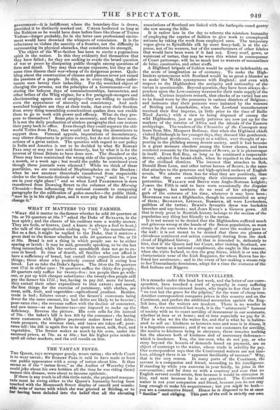WHAT IT MATTERS TO THE FARMER.
"WHAT did it matter to the farmer whether he sold 50 quarters at 70s. or 70 quarters at 50s. ?" asked the Duke of RUTLAND, in the best spirit ; and the cheers of his auditors were a worthy answer. They are fools, or knaves, (and a knave is always a fool to boot,) who talk of the agriculturist wishing to " rob " the manufacturer. But as a fact, it might be replied to the Duke, that it matters a great deal to the farmer whether he sells 50 quarters at 70s. or 70 at 508. Bread is not a thing in which people use to be either sparing or lavish : it may be said, generally speaking, to be the last thing retrenched, while the veriest spendthrift does not go to ex- cess in bread. In time of dearth, all families who can afford it have a sufficiency of bread, but curtail their expenditure in other things ; those alone who positively cannot afford it eating less bread. Let us take the Duke's figures. The 50 or the 70 quarters cost 175/. in either case : 70 quarters suffice for thirty-five people; 50 quarters only suffice for twenty-five : ten people then go with- out, or put up with cheaper substitutes : the twenty-five people still pay the farmer his 1751.; but, having to pay 50/. more for bread, they curtail their other expenditure to that extent ; and among the first things for the exercise of parsimony, with clothes, are meat, milk, fruit, and vegetables—agricultural produce. Besides, trade is bad ; failures occur ; and the farmer's customers being fewer for the same amount, his bad debts are likely to be heavier ; poor-rates rise ; the revenue suffers with the decline of commerce, and new taxes—as an Income-tax—are imposed to make up the deficiency. Reverse the picture. His corn sells for 50s instead of 70s. : the baker's bill is less felt by the consumer; the having more customers with lighter payments makes fewer bad debts ; trade prospers, the revenue rises, and taxes are taken off; poor. rates tall : the 501. is again free to be spent in meat, milk, fruit, and vegetables. The farmer makes as much by his corn, under the assumed prices, at 70s. as at 50s.; but his higher price tends to spoil all other markets, and the evil recoils on him.


























 Previous page
Previous page